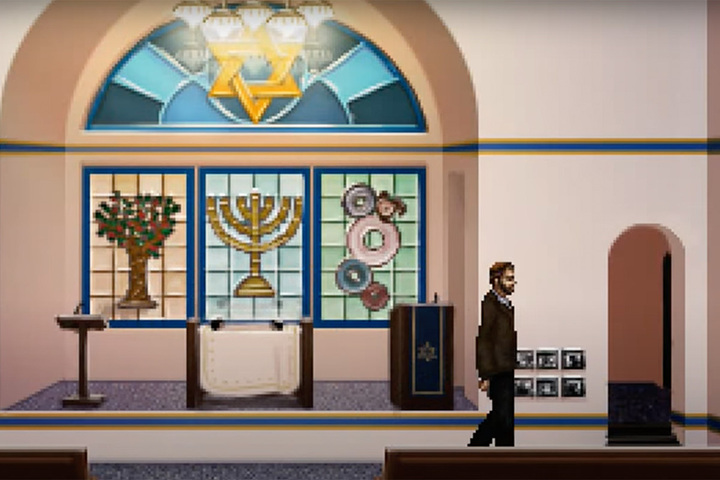For almost a decade now, video game studios and developers have slowly introduced diverse characters to attempt to transcend the “white-male-protagonist” mold which reigned throughout the ’80s, ’90s and ’00s. Although a few members of the tribe in games like The Last of Us Part II and the Wolfenstein series have broken ground on Jewish representation in the video game space, the 2010s and beyond haven’t seen a game with a Jewish lead character wherein that person’s Judaism is actively discussed with depth throughout the story. To find something of the sort, the clock must be turned back to 2006, when Dave Gilbert’s The Shivah from Wadjet Eye Games debuted on the indie scene.
The Shivah manages to be a game about Judaism with a Jewish protagonist (Rabbi Stone), while also incorporating the elements of a fun and funny archetypal murder mystery that appeals to any gamer. After an introductory trumpet and piano waltz that rivals that of “The Godfather,” the audience becomes aware of Rabbi Stone’s situation: His synagogue is losing membership, primarily due to his gloomy, pessimistic demeanor and his unwillingness to accept modern Jewish ideas. Due to his own folly, Rabbi Stone is losing his ability to keep its lights on at the fictional B’nai Ben Tzion. More so, we immediately see him lose his motivation to be a practicing Jew and rabbi in reaction to a particularly dreadful service. This setting of the stage is akin to many other secular story introductions: a time of lousy business, unfavorable publicity and feelings of hopelessness in one’s chosen career.
But here, there is an additional layer of particularly Jewish subtext. In our own world today, synagogues have a hard time retaining members and Jewish disagreement amongst ourselves puts strain on our communities. This game does not simply attach a rabbi main character to a secular premise and call it representation — rather, the inclusion of these uniquely Jewish issues creates a fictional environment that carries over the emotions and fears of passionate, dedicated Jews that exist in real life.
After being introduced to Rabbi Stone’s personal predicaments, we’re surprised with another: A former congregant, Jack Lauder, who parted ways with Rabbi Stone eight years before the game takes place, was murdered and left $10,000 to him. The perpetrator is still at large. At this news, Rabbi Stone is instantly brought back to “a time when things were simpler… A time when morals and ethics meant something.” We don’t yet know why this long-lost congregant’s death shakes up the protagonist more than any other death in the community, but one thing is for certain: Jewish subtext makes a return.
Rabbi Stone cannot be a bystander, collecting the money without much thought. He needs to uncover more, to find out why God, or man, has caused these events to occur. Even with the subtlety of this sequence, the player is able to distinguish between a typical call-to-action and the concept of Jewish duty. Obligation and pursuing justice are fundamental Jewish values, after all.
Rabbi Stone isn’t Batman, but his Judaism sparks a hero-like response to the knowledge of the murder. The game never explicitly states Rabbi Stone is compelled to get to the bottom of the mystery for any particular Jewish reason, but his conversations with himself about God’s role in the tragedy of Jack Lauder brings to mind the statement from the Talmud: “Great is study, for it leads to action.”
Rabbi Stone’s entrance into the mystery starts with a shiva call to the now-widowed Raj Lauder, where the main overarching Jewish theme of free will is emphasized. Players have been given a small dose up to this point; when talking to other characters, two unique response options are offered (such as “Honest Response” or “Incredulous Response”) alongside the “Rabbinical Response,” which is fixed to almost every dialogue choice. But it’s at this moment that the theme of personal autonomy is really highlighted, and it reoccurs throughout the rest of the game, showing how important it is to the game creators.
As the whodunnit unravels, the complex nature of Jewish free will is reinforced. It is revealed the Rabbi and Jack disagreed about intermarriage, and Jack’s death may have never happened if the Rabbi Stone never chose to alienate him from the congregation.
Also introduced is a corrupt rabbi who builds wealth on dirty money and has been a puppeteer behind multiple murders, highlighting how human decisions can lead those with righteous intentions to act the opposite. In the final brawl between the two rabbis, the discussion in between blows revolves around how God works versus how the world works. This argument and the characterization of the two men having it serves as an analogy of thousands of years of rabbinical philosophy on divine providence. The representation of “two Jews, three opinions” on the subject of free will portrayed in this manner profoundly supplements the game’s objective to dive deep into Jewish thought and identity while still being a piece of entertainment.
The cherry on top of this experimentation with Judaism’s free will in a video game is in the multiple different endings of The Shivah. While it isn’t the first game to contain multiple endings, it is notable because the player is able to see how their own free will influenced the story. The game gives options for dialogue choices and influence over the ending, all the while sticking to a script and fixed order of events. Funnily enough, the same can be said about life, ourselves and God, should one subscribe to that belief. Moral responsibility and free will are continuously studied and innovated upon mechanics in video games, but the connection to Judaism implicit in The Shivah sets it apart from any other secular in-game dilemma.
Adding The Shivah to your gaming backlog would be a worthwhile venture, and it takes less time than a synagogue service to get to the credits. Jewish issues, values and philosophy may be experienced as a subtle addition to the non-Jewish player (who will still enjoy the game) but will scream out loudly to anyone who has experienced or wrestled with them as a Jew. It’s nice to see Jewish representation in a video game, but it’s really meaningful to see it show up with such substance.
Late Take is a series on Hey Alma where we revisit Jewish pop culture of the past for no reason, other than the fact that we can’t stop thinking about it?? If you have a pitch for this column, please e-mail submissions@heyalma.com with “Late Take” in the subject line.




